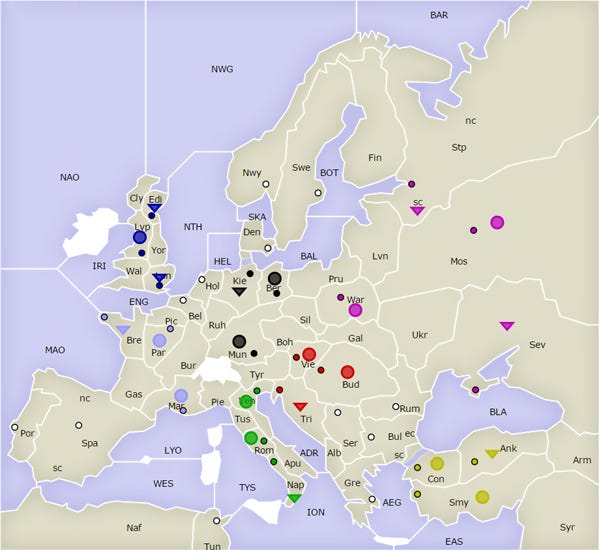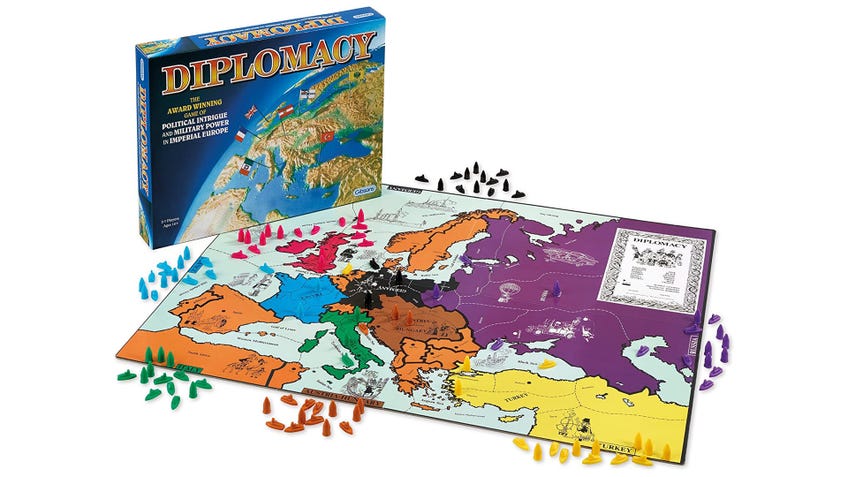Artificial Intelligence company DeepMind is teaching AI how to play classic board game Diplomacy
How do you backstab a robot, though?
Training artificial intelligence systems to play some of the best board games is nothing new - IBM’s Deep Blue was playing chess against world champion Garry Kasparov all the way back in 1996, while DeepMind’s AlphaGo Master beat world number 1 Go player Ke Jie in a three-game match in 2017. Then there are countless available games featuring AI modes, from Chess and Go to Ticket to ride and Mahjong.
The thing is, these are all games which there can only be one winner, with each player working independently of, and against, the others - zero sum games, in other words. What happens when a game requires cooperation and communication between players?
As TechRepublic reports, tech company DeepMind is now training AI systems to play classic board game Diplomacy, a game that requires cooperation and collaboration between players in order to have any hope of winning.
For the uninitiated, Diplomacy is a game for seven players in which each takes control of a European power at the start of the 20th century. There are 34 supply centres on the board, of which one player must control 18 at once in order to win. While the mechanics of moving units about the board are very simple, no one player can get ahead without help from others - whether that help comes in the form of a nonaggression pact or a joint martial effort. That need to collaborate and form alliances, however temporary, is at the very heart of Diplomacy - it’s also why the game has a reputation for ruining friendships and starting arguments.

The challenge DeepMind’s AI agent faces in order to become a decent Diplomacy player, in other words, is drastically different when compared to the process of, say, becoming good at chess. As research engineer Tom Eccles put it to TechRepublic, “Diplomacy has seven players and focuses on building alliances, negotiation and teamwork in the face of uncertainty about other agents. As a result, agents have to constantly reason about who to cooperate with and how to coordinate actions”, which certainly sounds familiar.
Before you start imagining what you might say to the Robo-Kaiser or Tsar Nicholas 2000 in order to shore up your alliance, however, it’s worth noting that DeepMind’s research is currently focused on a rules variant of Diplomacy in which there is no communication between players - or press, to use the game’s parlance. In this variant, commonly referred to as ‘gunboat diplomacy’, players aren’t allowed to talk to one another. They submit their orders in each round without knowing what any of the other players intend, meaning the focus narrows solely to where each player’s pieces are going, rather than what they’re also saying.
By stripping out the element whereby one has to consider the veracity of another player’s statements, the task becomes a matter of predicting troop movements from a finite number of possible combinations. While it’s still a considerable task, in theory it’s not too far removed from previous research done on games like Chess. Impressively though, DeepMind does plan to conduct future research around the full version of the game, enabling its agents to communicate in order to build relationships with other players and, of course, lie to their faces.
Speaking as an enthusiastic Diplomacy player who is fast running out of friends willing to play, it’s pretty exciting research. If you’re interested in reading more about Diplomacy, I wrote an article about how playing ‘by post’ transformed a frustrating board game into one of my all-time favourites.


